The crypto market’s recent surge has generated interest around the world. And if you’re one of those looking to jump in now, you need to pick a crypto exchange first. Picking the best crypto exchange is key, as it can make or break your trading experience.
However, with dozens of crypto exchanges around, you might be scratching your head: what is the best exchange for crypto trading? But don’t fret! This article offers you a helping hand. We will compare all the features, fees, and user experience of top rated crypto exchanges to make your decision easier. So, let’s begin.
| Exchanges | Coins | Maker/Taker Fees | Security | |
| Binance | 370+ | (Tier based) 0.1%, 0.1% – 0.2%, | 2FA, anti-phishing codes, and 24/7 threat monitoring. | Sign up to Binance |
| Phemex | 250+ | (Tier based) 0.01% – 0.06% | Cold storage, 2FA, bank-level double-entry bookkeeping system | Join Phemex |
| Kraken | 300+ | 0.00% – 0.25% 0.10% – 0.40% | Regular audits, offline/online storage, 2FA | Start with Kraken |
| Gemini | 80+ | 0.20%, 0.03% – 0.40% (for ActiveTrader) | SOC 1 & 2 certifications, AML/KYC compliant, 2FA,cold storage, address whitelisting | Try Gemini |
| Crypto.com | 350+ | 0.750% – 0%,0.05% – 0.025% | Real-time monitoring, 2FA, cold storage | Join Crypto.com |
| Coinbase | 250+ | 0.5% basic spread fees | Cold storage, 2FA, dark web monitoring | Begin with Coinbase |
| KuCoin | 800+ | 0.020%, 0.060% | Regular reserves audit, multi-sig, real-time alerts | Start with KuCoin |
| Cash App | Limited | NIL | Encryption, fraud protection | Try Cash App |
| Bisq | Limited | 0.12%, 0.88% | multi-signature address, three-tier dispute system | Check out Bisq |
| Bybit | 1219+ | 0.1%, 0.1% | 2FA, anti-phishing codes, cold wallet storage, and multi-signature approvals | Visit Bybit |
| OKX | 300+ | (Tier based)0.08%, 0.1% | KYC/AML compliance, SOC 2 certified, cold storage, withdrawal passwords | Join OKX |
10 Best Crypto Exchanges to Know
Binance – Low Fees with a Wide Range of Cryptos
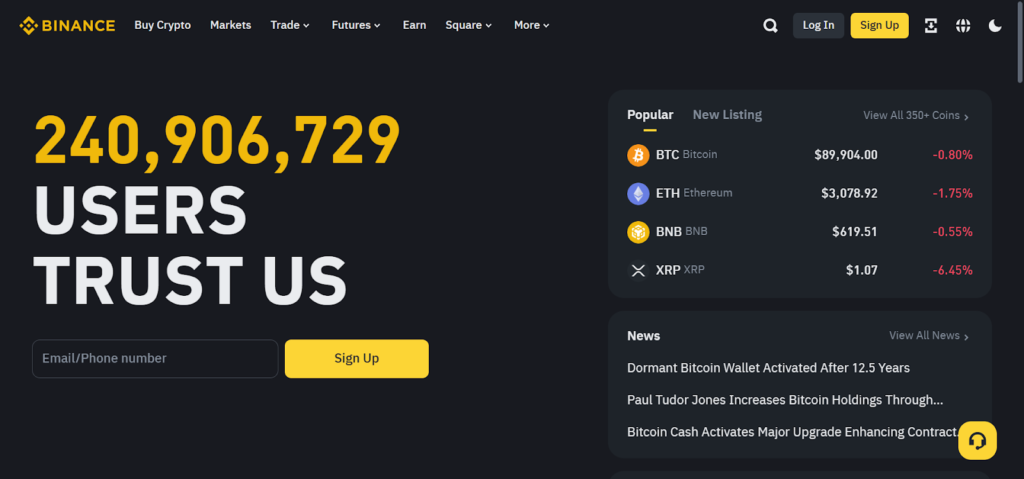
Binance is one of the largest and most well-known exchanges in the world. Founded by Changpeng Zhao (CZ) in 2017, it now has 200 million users from 100 countries, offering a wide range of cryptocurrencies.
Binance also allows you to trade cryptocurrencies directly with one another through Peer-to-Peer (P2P) trading. This means no more cashing out (or moving into another stablecoin) to get your new currency.
Another groundbreaking feature that makes Binance the best crypto exchange is its low fees. Binance charges only 0.1% for crypto-to-crypto trading, which is among the lowest in the industry.
There is no withdrawal fee for deposits, but withdrawals vary by cryptocurrency. Further, Binance follows a tiered fee system. Tier 0 has zero fees, but it is limited to a few Bitcoin pairs. Tier I fees begin at 0.1% for makers and 0.2% for takers on certain pairs. Tier II trades are slightly more expensive. But if you use Binance Coin (BNB) to pay fees, you will receive an extra 25% discount. Pretty neat, right?
Binance has a bunch of other financing options, too. It offers a lucrative staking service. This makes it easier for you to earn returns coins even without technical knowledge. Further, there are features like Binance referral ID, Binance Visa card and much more.
Binance puts security first with tools like two-factor authentication through Google Authenticator or SMS. There is also a KYC process that needs to be completed. It also employs whitelist withdrawals, anti-phishing codes, and 24/7 threat monitoring.
Pros
- Very well-known crypto exchange platform.
- Super low trading fees.
- Huge selection of cryptos.
- Robust security measures.
- Beginner friendly.
Cons
- Not available in the US or UK.
- Regulatory issues in the past.
OKX – Comprehensive Platform with Global Access
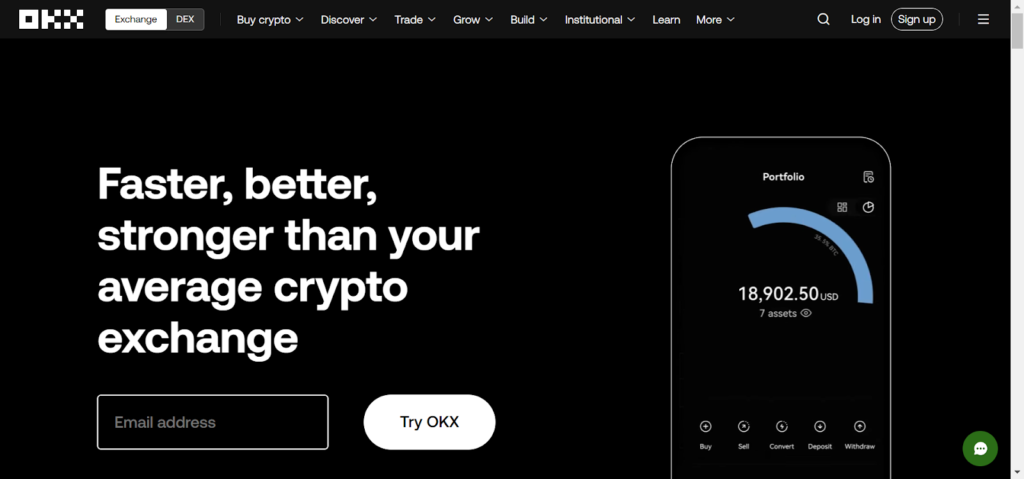
OKX is a fantastic option if you’re looking for an exchange with global reach. Founded in 2017, it now boasts over 50 million users across 100 countries and is competing with other top rated crypto exchanges. CoinMarketCap ranks OKX 4th for its huge volume of trading and liquidity.
OKX gives you a bunch of trading options to choose from. The list includes spot, margin, futures, perpetual swaps, and many more. The spot trading supports more than 300 cryptocurrencies across 630 pairs.
The OKX platform is also geared towards advanced traders who can take advantage of up to 100x leverage on futures or sophisticated options contracts.
OKX offers an easy-to-use design that is ideal for beginners. It’s easy-to-navigate layout allows you to access essential tools quickly. You can easily manage crypto, swap currencies, and check portfolios through its streamlined user interface.
OKX doesn’t skimp on security. It complies with KYC/AML regulations and has even got SOC 2 Type 2 certification. Additionally, it’s got all the bells and whistles for more security, with features like cold storage, withdrawal passwords, and anti-phishing codes.
OKX also has a tiered fee structure. If you buy or sell cryptocurrency, you will pay a small fee, starting at 0.08% for makers and 0.1% for takers. However, traders with high volumes qualify for discounts. Further, each option, futures contract, or swap comes with its own set of fees.
Pros
- Best crypto exchange in terms of global presence.
- Huge crypto selection and trading pairs.
- Easy-to-use layout for beginners.
- High security.
Cons
- Regulatory uncertainty.
- Customer support is poor.
Phemex – Most Efficient Crypto Exchange
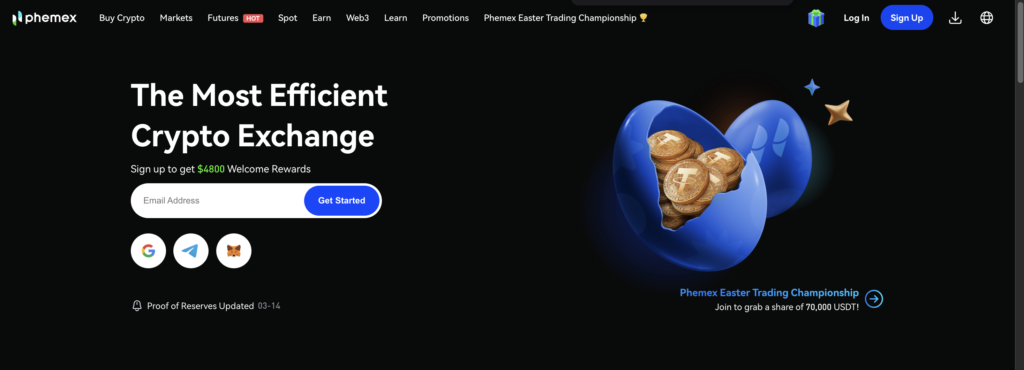
Phemex is a Singapore-based cryptocurrency exchange founded in 2019 by former Morgan Stanley executives. It has quickly gained popularity, attracting over 2 million users and ranking among the top 10 crypto derivative exchanges by daily trading volume.
The platform offers a wide range of trading options, including spot trading, margin trading, perpetual futures contracts, P2P trading, and staking services. Phemex lists over 340 spot trading pairs and has its own native token called Phemex Token (PT). Its fee structure is competitive, with maker/taker trading fees ranging from 0.1%/0.1% at the highest to 0%/0.0325% at the lowest. Users can also get a 20% discount by using PT tokens.
New users can benefit from the Phemex invitation code F928P8, which offers a welcome bonus of up to $4,800 and a 50% discount on trading fees . To claim these rewards, users need to register with the code, complete identity verification, make a deposit, and start trading.
Pros:
- Wide range of trading options and instruments
- Competitive fee structure with discounts
- Generous welcome bonuses for new users
- Strong security measures, including multi-signature cold wallets
Cons:
- KYC verification required to access full features and bonuses
- Some promotions may have specific eligibility criteria
Kraken – Excellent for Advanced Trading Tools
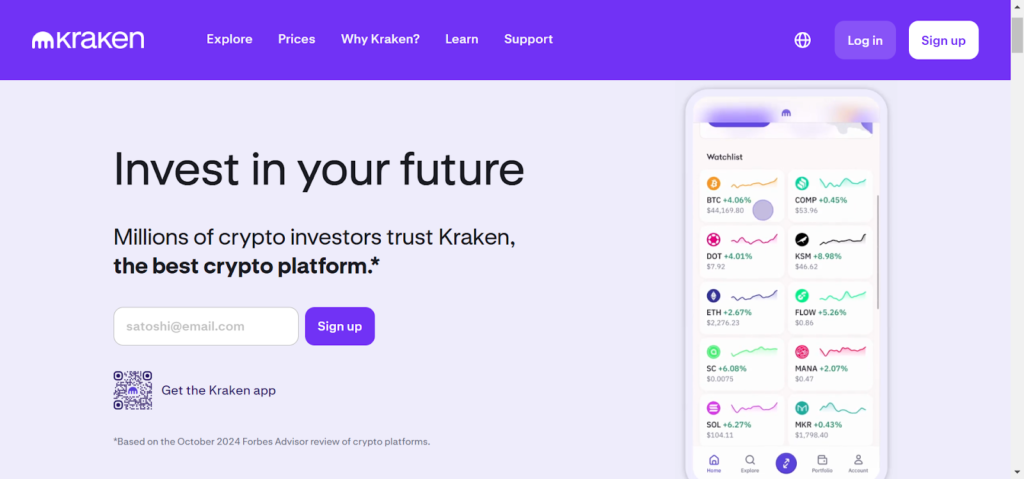
Kraken is the oldest cryptocurrency exchange with a huge coin selection. It was established in San Francisco in 2011 and supports over 190 countries now. For beginners to start, Kraken offers basic trading features like spot trading.
For professionals, it offers advanced trading options like futures contracts, margin trading, and Over-The-Counter (OTC) trading.
What makes Kraken the best crypto exchange is its sophisticated tools for analyzing market data and its customizable charts. This lets you trade in different modes and track your portfolio with a really cool dashboard. These features are available on Kraken Pro.
If we talk about Kraken’s security, it’s top-notch! It performs audits of its reserves regularly. Kraken also stores assets offline to ensure their security. The two-factor authentication (2FA) feature is also available to enhance account security.
Regarding fees, Kraken charges differently depending on the platform and type of transaction. For instant buys, a percentage fee is charged, which may be accompanied by a spread fee. Your funding method may incur additional charges, such as credit card fees.
However, the Pro version comes with lower fees. It charges maker fees of 0.00% to 0.25% and taker fees of 0.10% to 0.40% based on 30-day trading volume.
Further, Kraken offers exciting trading features like Kraken referral, a fantastic NFT marketplace and much more. Kraken also has high staking perks, with rewards paid twice a week and the option to un-stake instantly, penalty-free.
Pros
- Reputable exchange with a wide crypto range.
- Suitable for both beginners and professionals.
- High-quality trading tools.
- Plenty of educational resources.
- Top-of-the-line security measures.
Cons
- Limited accessibility to staking.
- High instant buy fees.
Gemini – Secure and Regulated for Peace of Mind
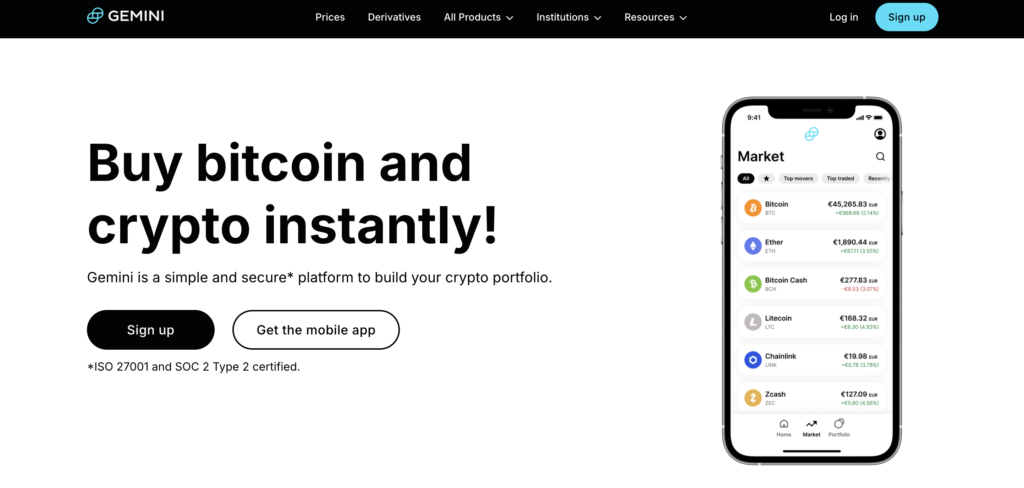
Gemini is certainly a contender for the best crypto exchange based on its strong focus on security and regulatory compliance. Founded in 2015 by the Winklevoss twins, the platform allows users to purchase, sell, and store more than 70 cryptocurrencies.
Gemini’s “security-first” mentality has helped it achieve SOC 1 Type 2 and SOC 2 Type 2 certifications. This signifies high levels of data security, making it one of the top rated crypto exchanges. For asset protection, Gemini uses two-factor authentication, address whitelisting, and extensive cold storage methods.
Gemini is compliant with Anti-Money Laundering (AML) and Know Your Customer (KYC) standards and regularly publishes reserve reports.
Gemini is also perfect for beginners with its easy-to-use trading platform that allows users to engage in cryptocurrency trading. The exchange also has Gemini ActiveTrader, a platform for experienced cryptocurrency traders.
Gemini ActiveTrader allows you to place market and limit orders, use advanced charting tools, see the full order book, and more. Plus, it also has low trading fees.
The fees are one thing Gemini can improve. In comparison with its competitors, Gemini’s exchange and mobile platforms charge higher fees, ranging from $0.99 up to 1.49% for web orders. ActiveTrader charges maker fees between 0.00% and 0.20% and taker fees between 0.03% and 0.40%. But these fees are based on your 30-day trading volume.
The Gemini also offers exciting features like a staking protocol, an NFT marketplace with high-profile collaborations and even a Credit card that offers crypto rewards.
Pros
- World-class security measures.
- SOC 1 & 2 certifications.
- Ideal for beginners and pros.
- Offer your own credit card, NFT market and much more.
Cons
- Limited options for staking.
- High fees.
Crypto.com – Great All-in-One Platform for DeFi and More
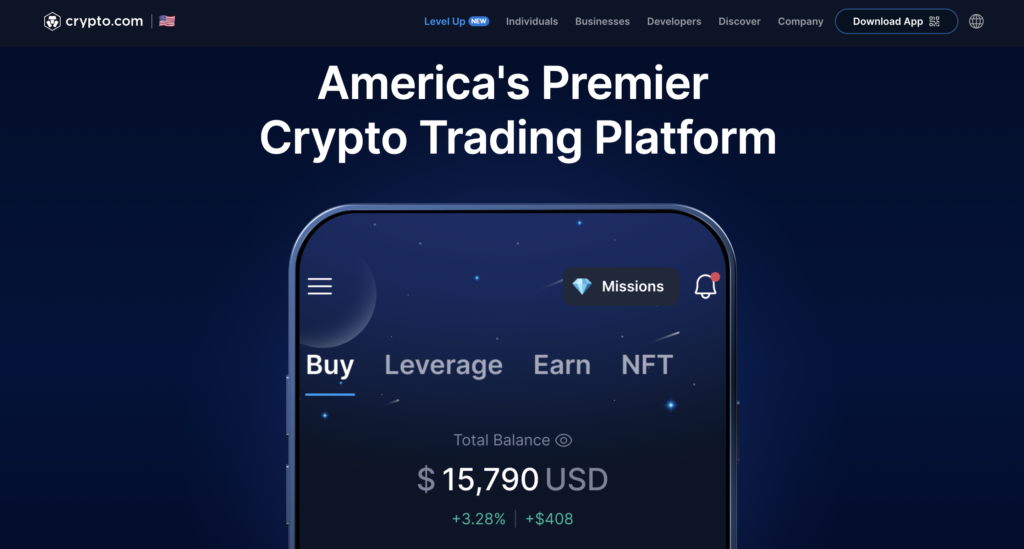
Crypto.com is another best crypto exchange that you can trust! Launched in 2016, the platform has grown into an all-in-one platform with more than 50 million customers in nearly 90 countries.
One of the flagship features is its DeFi wallet. This is a non-custodial, decentralized wallet that gives you complete control over your crypto and your private keys. You can use the DeFi wallet for various activities on multiple blockchains, including staking, swapping tokens, and lending. So there’s something for everyone.
Crypto.com also offers Visa debit cards, which can be used to earn cash back on spending and offer other perks. Best of all, there is no annual fee.
Crypto.com follows a maker/taker fee structure defined by 30-day trading volume. Maker and taker fees are charged starting at 0.750% on deposits under $250,000. Maker fees can reach as low as 0% for higher volumes. While taker fees can reduce to 0.05%, with select pairs offering reduced taker fees of 0.025%.
In terms of security, Crypto.com ensures a high level of protection through two-factor authentication and real-time threat monitoring. Digital assets are stored in cold storage to protect users’ funds.
Pros
- Non-custodial all-in-one wallet.
- Offer prepaid Visa card.
- Interest-earning opportunities.
- Full control over your crypto and private keys.
Cons
- Somewhat high fees.
- Limited margin trading features.
Coinbase – Beginner-Friendly and Easy to Use
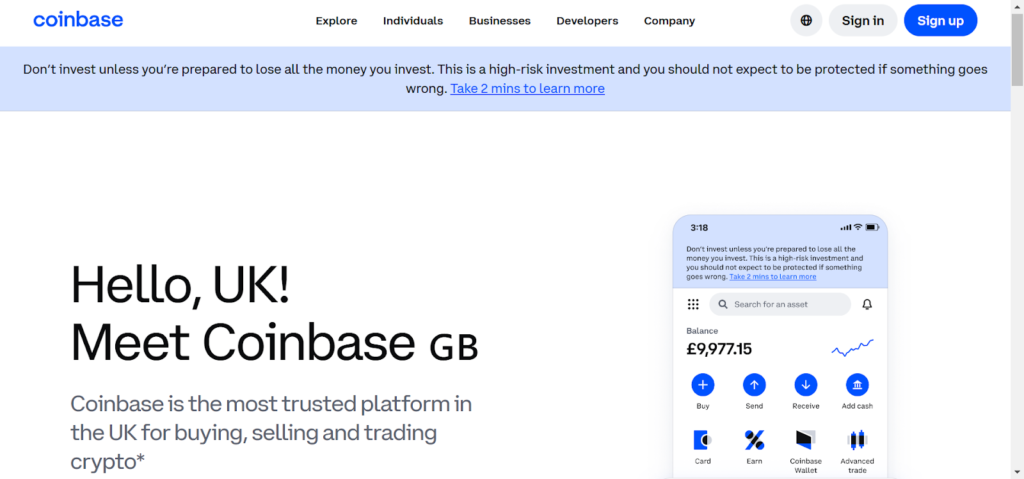
Since its creation in 2012, Coinbase has maintained its position as the best crypto exchange. Right now, Coinbase has the third largest trading volume, according to CoinMarketCap. It now offers over 250 cryptocurrencies, including top assets like Bitcoin and Ethereum.
With its user-friendly interface, Coinbase is ideal for newbies so they can start trading crypto. Another reason why Coinbase is the best exchange for crypto beginners is that it is packed with educational resources. It offers many learning tools that help you learn about cryptocurrencies.
Further, Coinbase offers a learn-to-earn program where you can earn crypto by doing simple tasks. However, some of these incentives are limited to certain locations.
But if you’re a professional trader, Coinbase Pro could be a good fit. This sophisticated platform gives you access to advanced trading features like 550+ spot pairs, crypto derivatives, advanced API support and TradingView charts. It also has lower maker and taker fees.
Coinbase also comes with a lucrative staking protocol. This offers high payouts and flexible redemptions. And it’s all managed from one interface.
Coinbase has an unclear fee structure. It uses spread fees that are based on your location, payment method, order size, and market conditions at the time you place your order. Coinbase’s basic platform charges a spread fee of approximately 0.5%, which locks in the price before the trade is confirmed.
Coinbase puts a huge emphasis on security with features like cold storage, two-factor authentication, and vaults. It also monitors the dark web for compromised customer passwords and encourages external security keys for enhanced protection.
Pros
- Best crypto exchange for beginners.
- Special learn-to-earn program for newbies.
- High-level security.
- Staking service.
- Best in-class tool with Coinbase Pro.
Cons
- Ambiguous fee structure.
- High commissions on yields.
KuCoin – Ideal for Altcoin Variety and Low Fees

KuCoin is one of the top rated crypto exchanges and has established itself as a premier one-stop crypto shop. Launched in August 2017, the exchange has a staggering collection of 800 cryptocurrencies along with a wide selection of altcoins. And it is available in 200 countries.
If we talk about fees, KuCoin is among the cheapest. Its maker/taker fee structures are determined by the trading levels of users (LV 1-12). The higher your trading level, the lower your fees will be. These fees range from -0.005% to 0.1%.
For futures trading, KuCoin charges 0.02% for makers and 0.06% for takers. The withdrawal fee covers blockchain costs, but all users are subject to withdrawal limits. These robust low fees contribute to KuCoin’s popularity, making it the best crypto exchange with low fees.
KuCoin offers an advanced trading interface that allows traders to customize everything. It offers trading charts and charting tools from TradingView, along with intelligent token categorization.
And if you want to earn passive income then KuCoin trading bots are the way to go. These automated trading bots execute your trading strategies based on your predetermined parameters. To top it off, KuCoin even comes with preloaded strategies you can use to build your first trading bot!
For overall security, KuCoin regularly conducts third-party proof of reserves audits to ensure that asset reserves are secure. These assets are split between cold, warm, and hot wallets, all of which are secured with multi-signature technology. KuCoin monitors wallet addresses 24/7, and there are alerts set up to warn the team if anything looks fishy.
Pros
- Tons of cryptocurrencies and altcoins at hand.
- Lowest trading fees.
- High customization for professionals.
- Automated Trading bot.
- High security.
Cons
- Licensing issues in the U.S.
- Not beginner-friendly.
Cash App – Simple Bitcoin Buying for Everyday Users
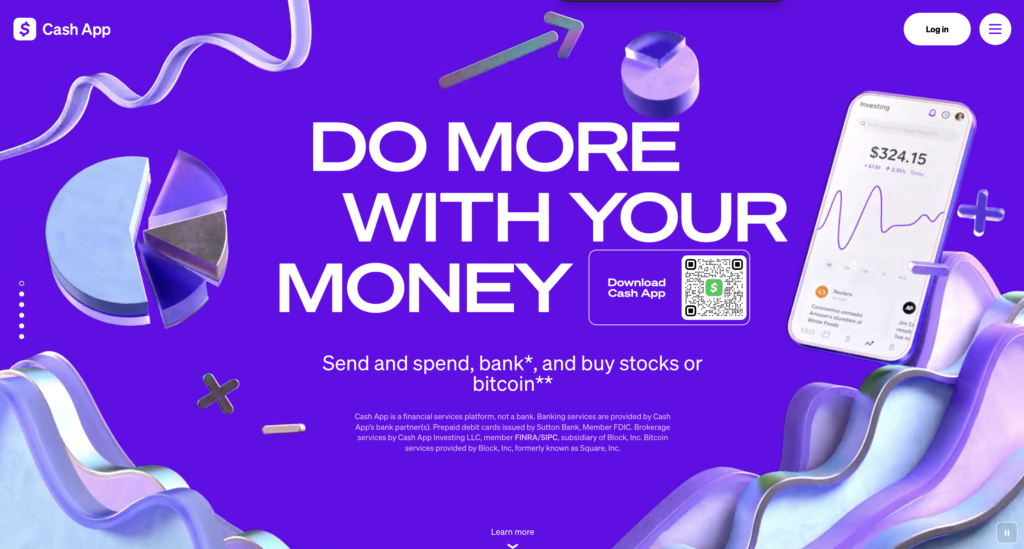
If you’re looking for something simple, Cash App might be right for you. Launched in 2013 by Block, Inc., Cash App provides Peer-to-Peer payments, banking, and investment options in the US and UK. It works similarly to other online payment systems such as PayPal and Venmo. But the coolest thing about this app is that you can instantly buy, sell, store, withdraw, and deposit Bitcoin.
Making an account on Cash App is extremely simple. Just enter your name, email or phone number, pick a unique cashtag, and you’re ready to go. The simple interface allows you to easily switch between Peer-to-Peer transfers, debit card banking, investing, and tracking your finances.
You can easily trade stocks, ETFs, and Bitcoins using Cash App. Unlike most of its competitors, Cash App also lets users withdraw Bitcoin to third-party wallets, making it stand out from the rest.
Cash App provides a custodial wallet where you can send and receive only Bitcoins. This type of wallet is controlled by the platform itself. So, it’s recommended to move your cryptocurrency to your own non-custodial wallet if you want complete control.
Cash App doesn’t follow the maker/taker fees model. Instead, you have to pay fees based on your purchase amount and the market when you buy Bitcoin. Generally, they range between 1.5% and 2.3%, which is a pretty standard rate. The cool thing about Cash App is that it explicitly shows the fee when you go to make a purchase, so you know what the fee is.
Pros
- User-friendly interface.
- Trade commission-free on stocks and ETFs.
- Quick and easy account creation.
Cons
- Its Bitcoin wallet is custodial.
- Only Bitcoin is supported.
Bisq – Decentralized and Private Exchange Option
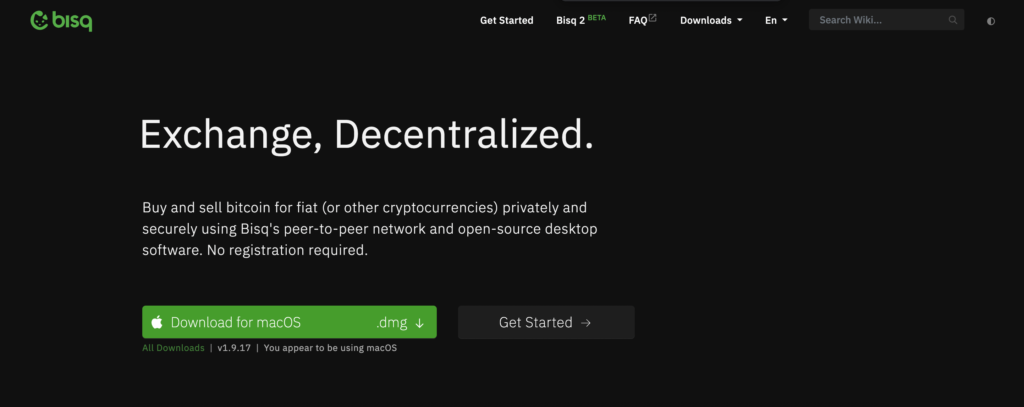
Bisq offers a truly decentralized exchange experience that differentiates it from many of its competitors. With its roots in 2014, Bisq has emerged as a popular platform for crypto traders who want financial privacy and trustless Peer-to-Peer trading.
The interesting part is that Bisq is not a web-based Decentralized Exchange (DEX). It is, however, open-source software that you download onto your computer, which further reduces the chances of a counterparty or centralization attack. This means you’re in control and don’t need any third parties to help you.
Unlike Centralized Exchanges (CEX), Bisq requires no private information or KYC for registration. This means there won’t be a waiting time for it to validate your photo ID.
Additionally, you won’t experience any problems funding your account. Your payment will be sent directly to the seller, so the money will not get entangled in the system. However, there are some limitations, particularly at the beginning.
On Bisq, traders pay their trading fees to fund the Bisq Decentralized Autonomous Organization (DAO), and they may either use Bitcoin or the Bisq BSQ token to do so. This offers up to a 50% discount to traders. The combined BTC trading fee rate is 1%, with makers paying 0.12% and takers paying 0.88%.
Bisq relies primarily on three security mechanisms. First, every Bitcoin traded on the platform is secured by a multi-signature address with a 2-of-2 signature. Additionally, both buyers and sellers pay security deposits, which are returned after the transaction is done. And lastly, trade disputes are handled with a three-tier system that includes encrypted chat, mediation, and arbitration.
Pros
- An all-rounder decentralized experience.
- No geographical restrictions.
- No identity or KYC verification.
- Low Maker fees
Cons
- The setup can be challenging.
- High Taker fees.
Bybit – Top Choice for Derivatives Trading
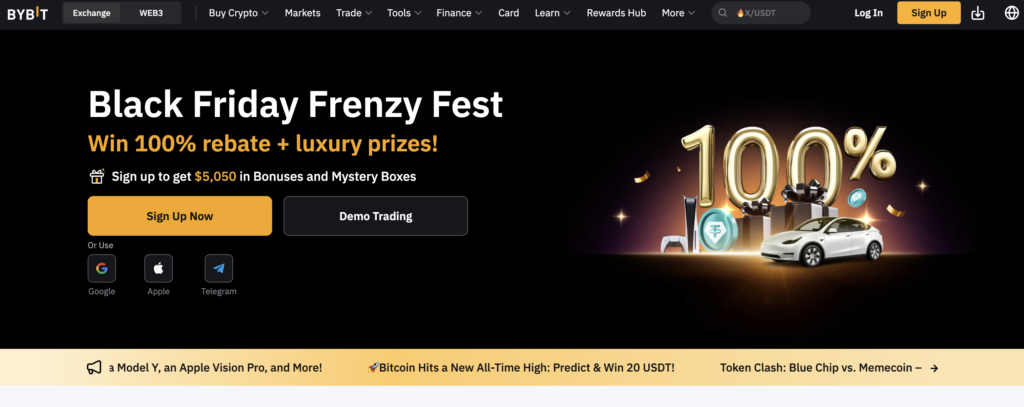
Bybit has made a name for itself in the derivatives market with its wide range of advanced trading tools. The Bybit exchange was started by former international currency broker Ben Zhou, who still runs it.
Derivatives are basically contracts with value derived from an underlying asset, such as cryptocurrency. Instead of owning the asset, you hold a contract to buy or sell it at a later date at a fixed price. And for this, Bybit is the best crypto exchange where you can buy and sell those contracts.
Bybit currently offers four different types of derivatives. First up is futures contracts, which allow traders to speculate on the price of an asset at a future date.
The next one is a perpetual contract, which does not expire; you can hold it indefinitely as long as you cover the funding fees. But these aren’t risk-free!
Bybit also offers inverse perpetual contracts that allow settlements in cryptocurrency, increasing exposure to BTC and other cryptocurrencies. And lastly, USDC options that work like futures but don’t need to be fulfilled at expiration, allowing them to be more flexible. USDC is the settlement currency for all options.
Bybit charges different fees for each product. Spot trading charges the highest fees, starting at 0.1% for makers and takers. Contracts begin with a 0.06% fee for takers and a 0.01% fee for makers. USDC options cost everyone 0.03%.
Through features such as 2FA, anti-phishing codes, cold wallet storage, and multi-signature approvals, Bybit offers the highest level of security. Another thing Bybit excels at is reliability. Bybit guarantees a 100-transaction-per-second (TPS), 24 hours a day, without interruption. Quite remarkable, isn’t it?
Pros
- Top pick for crypto derivatives.
- Massive collection of crypto.
- Multiple derivative options to choose.
- Low fees.
Cons
- Not good for spot trading.
- Unavailable in the U.S.
Understanding CEXs and DEXs
Every crypto exchange allows you to buy and sell cryptos, each with its own features. However, if you want to choose the best crypto exchange, you’ll need to understand the key differences and similarities between DEXs and CEXs. So, let’s take a look at them now.
1. Control and Ownership
A Centralized Exchange (CEX) is controlled and operated by a central authority, just like traditional stock markets. It offers the option of funding accounts with fiat currency or liquidating crypto assets back to fiat.
Decentralized Exchange (DEX) uses smart contracts for on-chain trades. This ensures that users have full custody of their cryptocurrency at all times without the involvement of third parties.
2. Safety
CEXs and DEXs implement security measures. But some things are different. CEXs tend to be more vulnerable to hacks due to their centralized nature, which makes users’ assets more vulnerable to theft. However, reputable CEXs take steps to minimize these risks through security measures.
DExs provide higher levels of security because funds are not centralized. This makes it harder for hackers to compromise user assets. But you need DEXs with robust smart contract security audits and protocols to make sure your funds are safe.
3. Level of Experience
If you’re new to crypto, you should start with a CEX to get your feet wet. The interfaces on these platforms are often user-friendly, making learning about crypto easier for first-time investors. When you get the hang of CEX, you can try a DEX and get a taste of web3 and other decentralized features.
4. Liquidity
CEXs typically have increased liquidity as a result of having large user bases and established market presences. This lets you get better price discovery, faster transactions, tighter spreads, and lower slippages.
DEXs rely on projects and the community to deposit tokens into liquidity pools, especially those that use Automated Market Makers (AMM). Though DEX is becoming more popular, it still cannot compete with CEX. This may result in slippage and affect the execution price for larger orders on DEXs.
Features to Consider in a Crypto Exchange
When deciding the best crypto exchange, you need to take several things into account. The following factors can help you select a platform that will provide you with a seamless trading experience.
1. Security
Security is the top factor you should look for in a crypto exchange. The exchange’s security measures determine the safety of your funds and info. Make sure your exchange of choice, whether it is CEX or DEX, supports Two-Factor Authentication (2FA) and other security measures.
Also, see if the exchange uses cold storage for most of its funds since it is less prone to hacking. Further, select an exchange that regularly undergoes independent security audits.
2. Regulatory Compliance
Regulatory compliance is another thing to keep an eye on. Make sure your exchange has Know Your Customer (KYC) and Anti-Money Laundering (AML) verification in place. Make sure the exchange is registered with the relevant regulatory bodies in the regions in which it operates.
You should also check out how transparent an exchange is about its owners and team. In regulated jurisdictions, exchanges have people behind the platform who are liable in the event of a problem.
3. Number of Cryptos and Trading Pairs
Many cryptocurrency exchanges do not offer every crypto available. Therefore, you should select an exchange that supports the crypto-assets you plan on trading. Popular exchanges offer Bitcoin, Ethereum, and other major altcoins, plus a whole lot more.
Also, look into the number of trading pairs the exchange offers. More trading pairs mean more flexibility and more options for traders.
Conclusion
In a nutshell, keep these points in mind when choosing the best crypto exchange. Each exchange is tailored to meet the needs of its customers. Whether you’re looking for robust, user friendliness or a platform with an extensive selection of new tokens, these are the top rated crypto exchanges to choose from.






